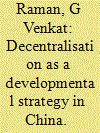| Srl | Item |
| 1 |
ID:
075333


|
|
|
|
|
| Publication |
2006.
|
| Summary/Abstract |
The premise of this article is that although the central role of the State in developing economies is indispensable, decentralisation of decision-making authority is inevitable in the governance of territorially large societies such as the People's Republic of China (PRC). A key component in the developmental experience of the PRC, as regards the two distinct models of development—Maoist and Dengist—has been a marked decentralisation of power and authority, an inevitable requirement in a territorially large and diverse country like China. The crucial point, however, is that during the Maoist and the Dengist eras, the strategies of development were distinguished by, among other features, two very distinct types of decentralisation.
Whereas the Maoist developmental strategy was predominantly administrative, the Dengist strategy of decentralisation is predominantly market-driven. Besides, it is highly imperative to note that there are a great many points of departure between the Maoist and the Dengist developmental strategies. This article briefly traces the origins of decentralisation in post-1949 China and compares the Maoist and Dengist policies with regard to decentralisation. It essentially focuses on decentralisation strategies in the period of market reforms and the significance of the Chinese model of development for the developing countries.
|
|
|
|
|
|
|
|
|
|
|
|
|
|
|
|
| 2 |
ID:
075341


|
|
|
|
|
| Publication |
2006.
|
| Summary/Abstract |
This article will engage in a brief survey of the geopolitical impediments to development in the Democratic People's Republic of Korea (DPRK). One cannot comprehend the present without understanding the thread which runs from the past to the present. Even a perfunctory knowledge of regional geography will highlight that the DPRK lies at the intersection of China-Russia-Japan and US interests. The central issues in the DPRK's developmental strategy are (1) state/regime survival and (2) resource allocation. In its earliest days the administration of Kim Il Sung was bedevilled by two alternative factions within the Workers Party: the Irkutsk faction beholden to the patronage of the USSR, which opted for and lost a leadership struggle in 1955, and the Yan'an faction of Chinese-oriented veterans. Once Kim Il Sung's power was consolidated, the primary adversary was and remains the United States and its ally Japan. Cumulatively both of these historical experiences have resulted in a total distortion of resource allocation; in the first instance because of the need to establish an independent identity, mooting the juche concept as its focus; and in the second, because of military expenditure of Herculean proportions. Reportedly 25 to 30 per cent of the population is either in the Korean People's Army or the Red Militia.
|
|
|
|
|
|
|
|
|
|
|
|
|
|
|
|
| 3 |
ID:
075343


|
|
|
| 4 |
ID:
075342


|
|
|
|
|
| Publication |
2006.
|
| Summary/Abstract |
The establishment of full diplomatic relations in January 1992 between the People's Republic of China and the State of Israel did not follow the normal pattern in that if did not result in a significant improvement of relations. Their desire for closer and mutually beneficial relations came into conflict with a growing American desire to impede such a relationship. As a result, while the Israeli overtures towards China were not only long, tedious and at times frustrating, the normalisation of relations as well failed to match up to the expectations. Indeed, the Sino-Israeli relations appear to have been better off before they were formalised. This third party intervention by the United States inhibits both Israel and China from reaping the fruits of normalisation and pursuing new avenues of cooperation.
|
|
|
|
|
|
|
|
|
|
|
|
|
|
|
|